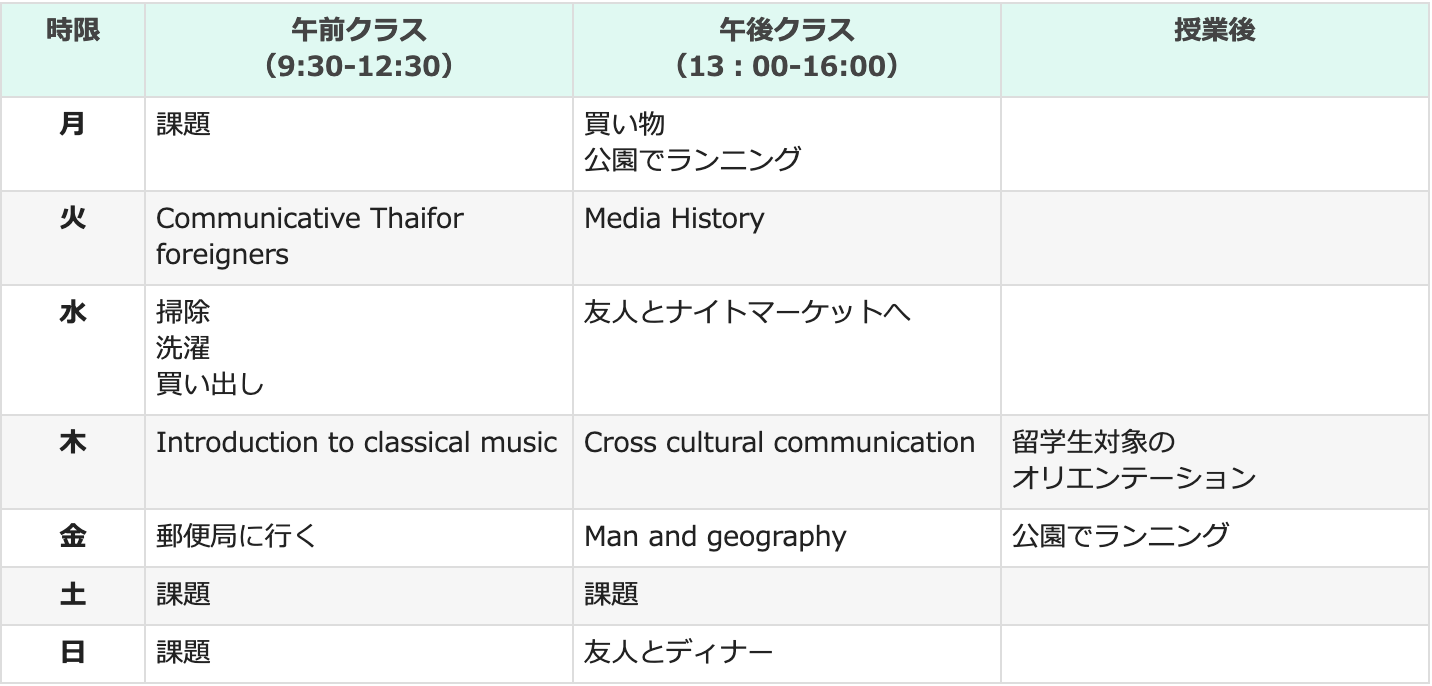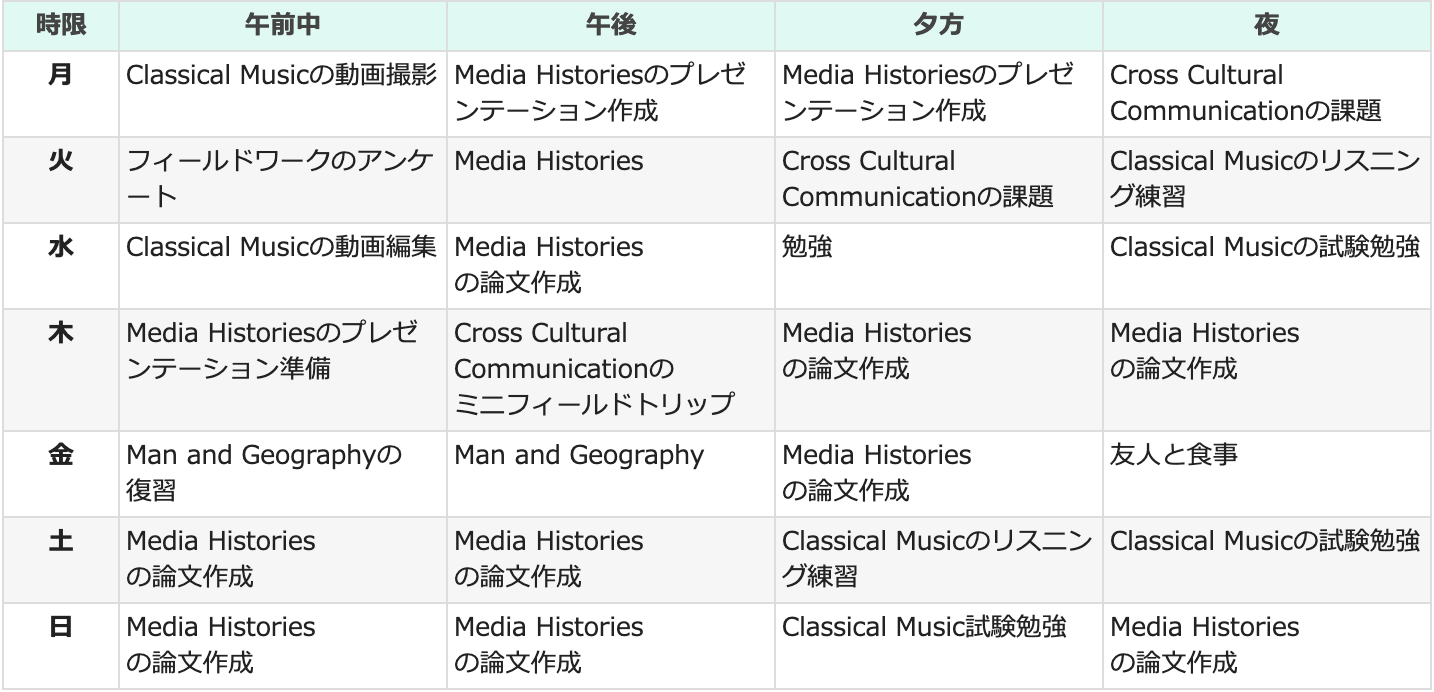- ホーム
- 学部・大学院
- 地球社会共生学部
- 留学(地球社会共生学部)
- 留学生活(地球社会共生学部):学部留学 マンスリーレポート(田島 理沙)
留学生活:学部留学 マンスリーレポート(田島 理沙)
- MENU -
学部留学 マンスリーレポート
INTERVIEW 留学直前インタビュー
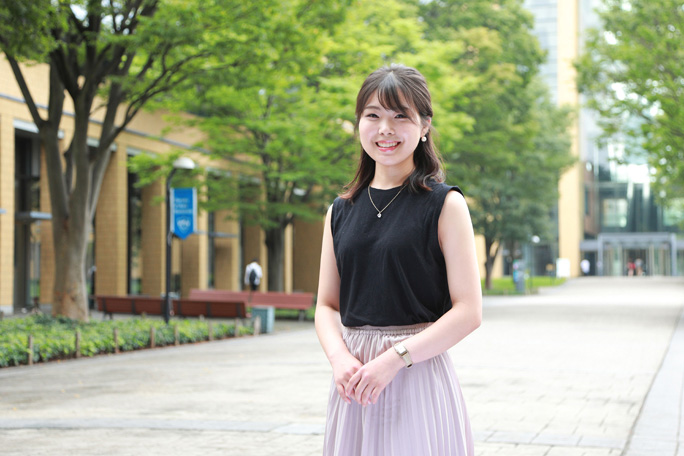
グローバルな環境で、何が見え、何を得られるのか。 未知の自分との出会いに胸が躍ります。
田島 理沙 2年
埼玉・私立大妻嵐山高等学校出身
留学先:タイ・チュラーロンコーン大学
留学期間:2019年8月→2019年12月
-留学先(国・大学)を選んだ理由は?
私が留学先に選んだチュラーロンコーン大学は、タイ国内で最難関といわれ、多くの留学生が在籍するグローバルな大学です。その環境で、これまで学んできた英語がどれくらい通用するのか挑戦してみたいと考えました。また、多様な文化にふれ合い、自分の価値観をアップデートさせたいとも思っています。
-留学に向けて準備したことは?
経営という視点から新興アジア諸国のビジネスモデルを考察したり、工業化の変遷を学んだ林 拓也先生の「アジアンビジネス論」と「特殊講義B(Ⅰ)」は、自分の興味分野で、留学先でも学びたいと思う学問であるのはもちろんですが、何よりこれから目の当たりにする社会について留学前に学べたことは大変意義深いと感じました。また、チュラーロンコーン大学ではディベートやプレゼンテーションの機会が多いと先輩から伺ったので、効果的な方法を会得できるように普段の授業から工夫を重ねる努力をしてきました。
-留学で最も期待することは?
いよいよ始まる留学生活では、さまざまな経験をし、気持ちが動く瞬間を心にとどめたいと思います。進路について考える時期でもありますが、就職活動情報や固定観念からだけではなく、自分の心に従った進路選択のために、しっかりと自分と向き合うつもりです。そこから何が見えてくるのか、何を得ることができるのか、未知の自分との出会いが楽しみでもあります。
-留学中にチャレンジしたいことは?
タイのヨガを習うことです!体を動かし、おいしいタイ料理を食べて、観光もたくさんしたいと思っています。今はタイ語が話せないことが一番の懸念ですが、マーケットで買い物する時や外出時の緊急事態に備えて勉強中です。タイ語の授業を履修する予定なので、予習も兼ねて少しずつフレーズを覚えていきたいです。帰国までにタイ語がどの程度話せるようになるのか、不安でもありますが精一杯、学んできます。このように大学での授業や課題は想像以上に大変になりそうですが、有意義に時間を使って、心も身体も健康に過ごしたいと思います。
田島さんからの【第1回 現地レポート】は10月中旬予定です!!
MONTHLY REPORT Vol.1 学部留学 マンスリーレポートVol.1
勉強に励みつつ体調面もしっかり管理して、 元気にタイライフを送っています 。
タイでの留学生活がスタートした田島理沙さん。チュラーロンコーン大学の様子や日々の生活について現地から第1回目のレポートが届きました!
-留学先大学の立地や環境は?
留学先のチュラーロンコーン大学はバンコクの中心地に位置しているため、電車・地下鉄・バス・タクシー・モバイル配車サービスなど、多種多様な交通手段を利用できます。加えてタイが誇る歴史的な国立大学ということもあり、大学周辺の治安は厳重に守られていてとても安全です。
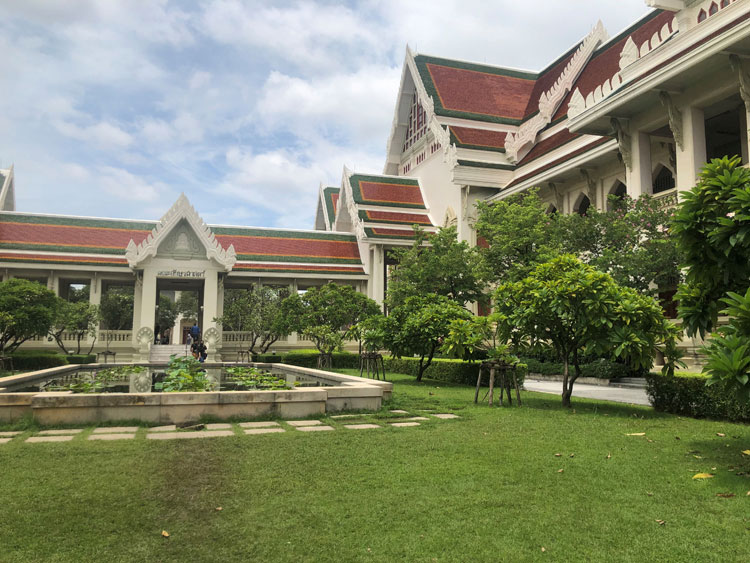
-キャンパスの雰囲気やチューター、TAなどの留学生へのサポートは?
各国からの留学生が多い大学なので、現地の学生が大多数を占める授業へ参加しても歓迎してくれます。タイでは日本のファッションや食、音楽がポピュラーなので日本語を学んでいる学生も多く、日本語で自己紹介をしてくれる学生さんにも出会いました! また、私たち留学生に対するサポートはバディ制度があり、現地の学生が対応してくれます。履修登録でどの授業を取るか悩んでいた際には、親切にわかりやすく説明してくれて、感謝の気持ちを抱くと同時に、これから始まるここでの生活が絶対に素晴らしいものになると心から思いました。
(画像:緑豊かで広大なキャンパスは理想的な環境)

田島さんの8月の、とある1週間
-学習面でのトピックは?
授業開始から10日ほど経過しました。派遣先のFaculty of Artsでは学部専門科目と一般教養科目から授業を選ぶことができるため、履修登録には悩みましたが、火曜日・木曜日・金曜日の3日間で5つの授業を履修することに決めました。
「Communicative Thaifor foreigners」はタイ語の授業で、他学部の留学生とも交流ができるインターナショナルなクラスです。タイ語にはまだ慣れず、難しいですが習得を目標にがんばります。「Media History」は私にとって最も難しい授業です。授業内容の難易度はもちろん、受講人数が5人と少人数なのでディスカッション、ディベート、先生への質問など積極的な発言が多く求められます。5人のうちの2人が英語圏からの留学生なので議論内容が高度になるため、取り残されないように必死です。「Introduction to classical music」は、さまざまな分野のクラシック音楽のビデオクリップを観て、聴いて学ぶ授業なのでとても楽しく学習しています。「Cross cultural communication」では”文化”と”コミュニケーション”をその定義から深掘りして学んでいます。このクラスでは異文化の一例として留学生である私が日本の文化をクラスメートに紹介するという場面が多く、日本文化について改めて考える機会となっています。「Man and geography」は、3年次生向けなので難しいですが、現地の学生たちがサポートしてくれるおかげで理解することができています。
-日本での授業との相違点は?
大きく異なる点は3時間という長い授業時間です。しかし、ディスカッションやグループワークなど、多様なスタイルで授業が進められるので体感的にはそれほど長く感じることはありません。また、すべての授業が英語で行われるので、毎時間の英語講義は想像以上に頭を使います。ディスカッションやディベートなどは相手の発言をきちんと聞き、要点をつかみ、的確な返答、あるいは関連した意見を述べることが求められるので、留学経験の浅い私にとって英語を使ったディスカッションは最難関といっても過言ではありません。しかし、失敗を恥じてためらうのではなく、まずは発言をして経験を積んで、徐々に発言内容に磨きをかけていこうと思っています!
-生活面でのトピックは?
体調管理に一層気を配るようになりました。寮にはキッチンがないため、食事は基本的には外食か野菜やフルーツを食材のままいただくかの二択になります。栄養バランスを考えるとともに、運動不足による体調不良を防ぐためにランニングやトレーニングを日課にしています。このように食事と運動の両面から体を整えることで、勉強をはじめとする各種のアクティビティへのモチベーションが高まると考えています。Readingのアサインメントが課された際は、お気に入りのカフェにパソコンを持ち込み、耳栓をして集中し一気に取り組みました。難しい課題が出題されても熟考し、納得のいくまで推敲することができるため、余裕のある時間割を組んだことは正解だったと実感しています。
-アクティビティでのトピックは?
ナイトマーケット「タラートロットファイ・ラチャダー」に出かけ、そこで見た色彩豊かな屋台の天井が光る、幻想的な景色は今でも目に焼きついています。学部主催の留学生向けオリエンテーションでは、先生方や学生の皆さんから歓迎の言葉をかけていただき、さまざまな催し物も楽しみました。その後、バディや友人たちとディナーに行き、バディの薦めで食べたことのなかったタイ料理に挑戦したり、互いに日本語、タイ語を教え合ったり、和気あいあいとした時間を過ごせたのも留学ならではです。週末の夜には1年次の頃から仲の良い青学の仲間たちとバンコクの中心地サイアムで再会しました。タマサート、カセサート、シーナカリンウィロート、そしてチュラーロンコーンと、4人全員が違う大学で学んでいるため、それぞれの授業内容や周囲の環境について情報交換できた有意義な時間でした。大好きな仲間と毎日会えた青学でのキャンパスライフが恋しくもありますが、それぞれの場所で生活し、時々会って励まし合い、留学後に成長した姿で相模原キャンパスに再集合できることが今から待ち遠しいです!
MONTHLY REPORT Vol.2 学部留学 マンスリーレポートVol.2
人気のカフェからトムヤムクンにマンゴー…、 タイならではの味のレポートです。
留学から1ヵ月が経った田島さんのタイでの生活はどのようなものでしょうか。
現地から第2回目のレポートが届きました!
田島さんの9月の、とある1週間
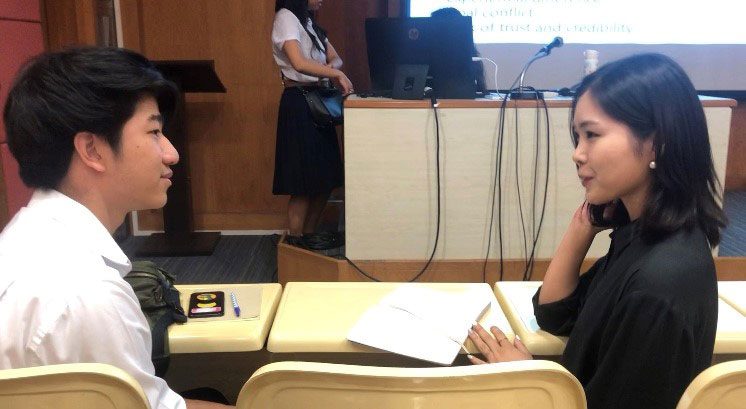
-学習面でのトピックは?
「Cross cultural communication」の授業では “My cultural identity”というテーマで、自分の性格や場面ごとの振る舞いの傾向を文化的側面から考察しました。これまで礼儀正しさや慎ましさは日本人固有の特性だと考えていましたが、授業内のフィードバックを通してタイ、インドネシア、マレーシアなどの他アジア諸国にも共通するということを新たに知りました。私はこの授業で唯一の日本人学生であるため、日本文化や考え方について意見を求められることが多々ありますが、日本に興味をもつクラスメートや日本での勤務経験がある教授がとても熱心に耳を傾けてくれるので、臆することなく発言できます。この授業で積極的に意見する習慣が身についたおかげで、ほかの授業でも以前より主体的に学べるようになりました。クラスメートはとても気さくで優しく、タイ語のクラスで課されたインタビューアサインメントを手伝ってくれました。
(画像:「Cross cultural communication」の授業にて、インタビューアサインメントを手伝ってくれたタイ人のクラスメート)

-アクティビティでのトピックは?
アメリカに住んでいる友人が会いに来てくれたので、授業以外の時間は観光名所を巡り、おいしい食べ物をたくさん食べて過ごしました。
タイには観光名所となっている寺院がいくつもありますが、今回訪れたのはその中でも一番有名な「ワット・ポー」です。最寄り駅とお寺の間にはチャオプラヤー川が流れているため、ボートで向こう岸へ渡りました。実際に見る黄金の涅槃像は全長46mと想像を超える大きさで圧倒されました。仏像だけではなく本殿の周りには花や鳥などのモチーフが緻密に描かれた美しい建造物があり、ゆっくりと散歩しながら楽しむことができます。
参拝後は寺院のすぐ近く、鮮やかな青のドリンクが飲めると人気の「Blue Whale Cafe」でブランチをいただきました。注文したホットラテがあまりにも青いため驚いてしまいましたが、バタフライピーというお花に含まれるアントシアニンの天然色素だそうです!
BTS エカマイ駅付近の「Dog in Town」という大人気の犬カフェでは、人懐っこく愛らしい犬たちとふれ合うことができ癒されました! この日のランチは中心地サイアムにある「バーンクンメー」というレストランに行きました。タイ語で「お母さんの家」という店名のこのお店では、タイの伝統的な家庭料理を楽しむことができます。私はタイ料理の代名詞ともいえるトムヤムクンを注文しました。酸味とまろやかさが絶妙なバランスのとてもおいしい一品でした。比較的新しい飲食店が多く若者であふれているサイアムですが、こちらのお店は内装もアンティーク調で落ち着いており、ゆっくりとお食事を楽しむことができました。
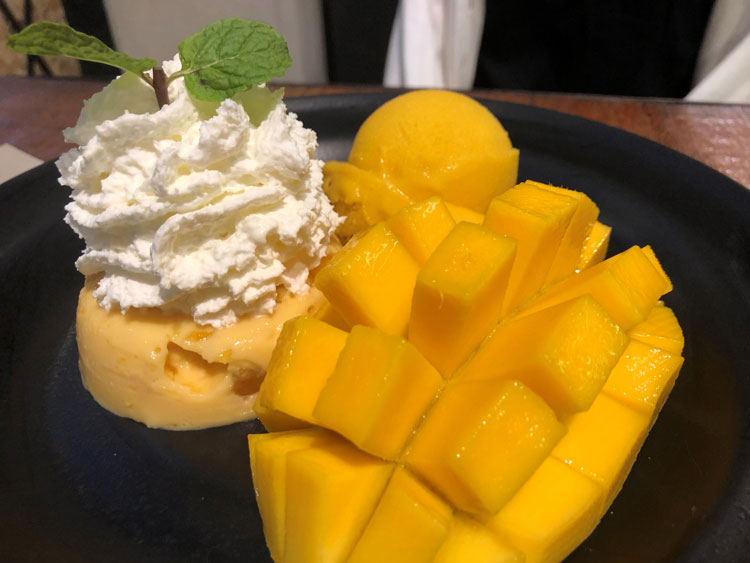
次の日は以前から気になっていたマンゴーデザート専門店「Mango Tango」を訪れました。日本の観光雑誌には必ずといっていいほど掲載されている大定番のお店です。一番人気の3種盛りプレートはカットマンゴー、マンゴープリン、マンゴーソルベを堪能できます。念願叶いようやく食べることができました!
雨季でスコールが頻繁に降るため、観光というよりグルメ中心の食旅でした。友人もアメリカに住んでいるため、お互い日本食が恋しく、しゃぶしゃぶ、お寿司、餃子、たこ焼き、うどん、ラーメンなどたくさんの日本食も楽しむことができてとてもうれしかったです。タイのお料理もおいしいですが、やはり母国の料理には特別な思い入れがあるため、格別においしく感じられます。タイに来て1ヵ月と1週間ほど経ちますが、授業や課題で忙しく、なかなか観光や外食を楽しむ時間がなかったので、今回友人が訪れてくれたことは、私にとってもタイを堪能する絶好の機会になりました。ステキな時間をどうもありがとう! もっともっとタイを知りたいと実感しました。

MONTHLY REPORT Vol.3 学部留学 マンスリーレポートVol.3
中間試験や論文課題が続きましたが、GSCでの英語の授業がここで役立ちました!
タイでの留学生活にも慣れてきた田島さん。現地から第3回目のレポートが届きました!
さて、どんなトピックがあるでしょう。
田島さんの10月の、とある1週間
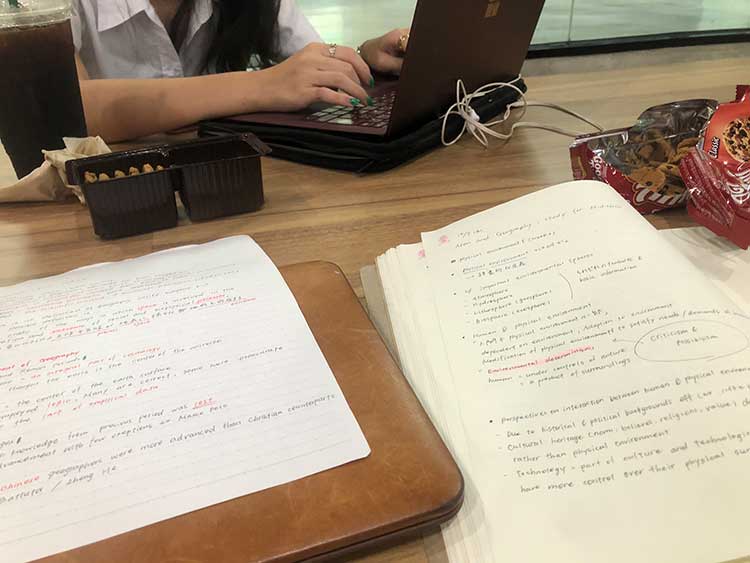
-学習面でのトピックは?
10月末までの約1ヵ月間は、中間試験やプレゼンテーション、論文の課題が相次いで課されていたので毎日必死に勉強していました。「Media Histories」の授業では”Home taking Exam”という論題を提示され、各自が締め切りまでに取り組むという馴染みのない試験形式です。初めは論文を書き上げることができるのか不安でしたが、綿密に構成を練り、推敲を重ね、完成させることができました。「Cross Cultural Communication」も同じく論文の課題でしたが、こちらはアカデミックライティングという形式で書かなければならなかったので、まずは参考文献となる英語の論文を探すところから始めました。アカデミックライティングでは、引用の仕方や文献の記載方法についての細かいルールが設定されていて複雑ですが、青学1・2年次前期の英語クラスで何度も論文を書いた経験があるので自信をもって臨むことができました。GSCでの学びが活きていると実感しましたし、がんばった成果を感じられたことは、今後の勉学への励みにもなると思います。「Man and Geography」は他大学の日本人学生と一緒に授業を受けていたので休日や放課後に共に試験勉強をしました。この試験は授業内筆記試験でしたが、あまりの難しさに衝撃を受けました。満足のいくできではありませんでしたが、期末試験を見据えてより一層勉強に力を注いでいきます。
(画像:友人と「Man and Geography」の試験勉強中です!)

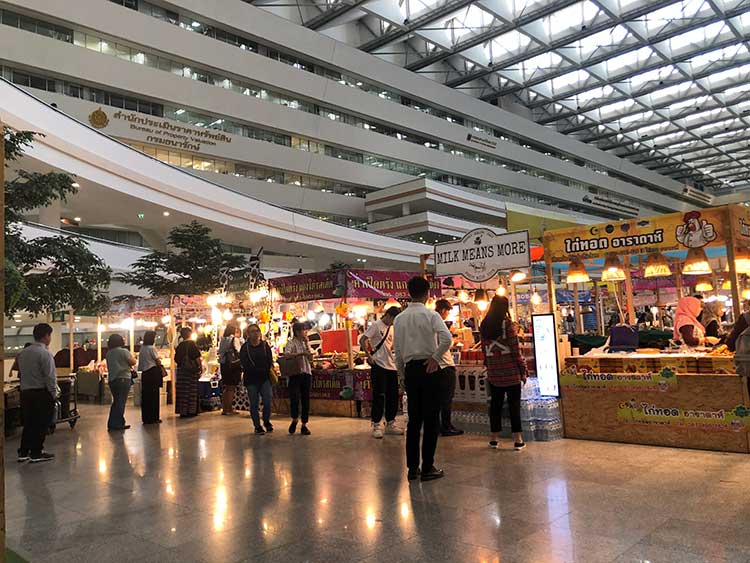
-生活面でのトピックは?
VISAの延長申請をするために書類を準備していたのですが、その際に必要となる出国カードを紛失してしまったことに気がつきました。慌てて警察署に行って事情を説明したところ、すぐに紛失届を発行してもらえ、事なきを得ましたが、今後は所持品管理に気をつけようと心に誓いました。後日、延長手続きをするためにImmigration Officeへ行きましたが、混み合うから早朝に行ったほうが良いと大学の職員の方からアドバイスを受けたので朝3時半に出発し、4時に到着、受付が開始される8時まで待機しなければなりませんでした。しかし、施設の中でマーケットが開催されていて、友達とみんなで朝ごはんを食べながら待つことができたので楽しかったです。無事に手続きが完了したので、安心して暮らせます。
(画像:Immigration Office内で開催されていたフードマーケット)

-アクティビティでのトピックは?
長い中間試験も無事終わり、1ヵ月ぶりに青学の友達とショッピングへ出かけました。彼女は2年次前期の「Academic English」のクラスメートで、「留学中にたくさん会おうね」と約束していたのですが、違う大学に留学したため今までなかなか会う機会を作れませんでした。サイアムで待ち合わせをし、人気の韓国料理店でおいしいごはんを食べながらお互いの近況報告をしました。久しぶりの再会だったのでショッピングをしている間も話が尽きず、とても楽しい時間を過ごすことができました。しっかり者で想像力豊かな彼女はいつも私に刺激とインスピレーションを与えてくれます。この1ヵ月は孤軍奮闘で課題と試験に打ち込んできましたが、こうして私ががんばれるのも、離れていても心の支えになる友達がいるからだな、と改めて実感しました。
そしてこの日は素敵なお買い物ができました! 8月から10月上旬にかけてのタイの雨期で通学時に履いていた靴が傷んでしまったので、「Ballet Shoes」という老舗の革靴専門店で見つけたお気に入りの一足を購入しました。シンプルな黒のバレエシューズなのですが、本革なので長く履くことができます。帰国後も留学の思い出の品として使い続けられるように、大切に履いていきたいです。
MONTHLY REPORT Vol.4 学部留学 マンスリーレポートVol.4
異文化の中で生きる難しさを乗り越えられたのは、温かい言葉で支えてくださった先生のおかげです。
プレゼンテーション、論文、筆記&リスニング試験に動画制作。
加えてフィールドトリップにも力を入れた田島さんから第4回目の現地レポートが届きました!
田島さんの11月の、とある1週間
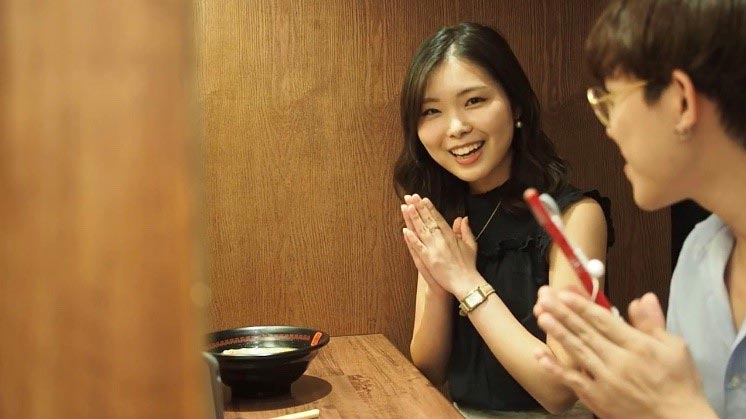
-学習面でのトピックは?
11月末から12月上旬にかけて実施される最終試験を控えていたので、試験勉強に励んでいました。「Media Histories」の授業ではメディア学に関連する調査を行い、”Final Project”として二度のプレゼンテーションと論文を課されていました。私が選んだテーマは「東日本大震災におけるソーシャルメディアの役割」についてです。30以上の文献を精読、データを収集し、その結果を20分間の単独プレゼンテーションで発表しました。もちろん容易ではありませんでしたが、自力でプロジェクトを大成できたことは自信になりました。「Classical Music」では実際にオーケストラを鑑賞し、その構成や曲の分析を行い、カメラに向かって説明するというビデオクリップ提出の課題と、リスニング試験、筆記試験の3つが課されました。ビデオ課題では正確な曲分析、音楽の学問的知識、正しい英文法のほかに、動画編集技術も求められていたため、良質な動画を仕上げられるよう編集に多くの時間を割きました。リスニング試験、筆記試験に不安があったのですが、前日まで猛勉強をしたおかげで手応えを感じることができました。「Cross Cultural Communication」では “Cultural identity”についてのグループプレゼンテーションとインタビュー課題が課されました。私はグループ内唯一の留学生だったので、他のタイ人のメンバーから日本文化についてのインタビューを受けました。ラーメン屋さんで食事をしながらのインタビュー撮影はとても楽しかったです。ほとんどの授業が11月中に終了し一段落しましたが、12月には「Media Histories」の最終論文の提出と「Man and Geography」の試験を控えているためまだまだ気は抜けません。
(画像:「いただきます!」。最終課題のインタビュー動画撮影中です)

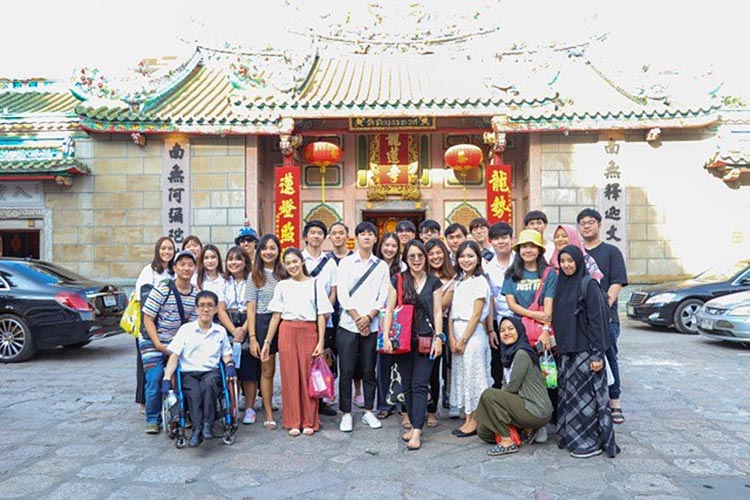
-生活面でのトピックは?
11月は「フィールドワーク」に最も力を入れていた1ヵ月でした。私は「タイの若者の加糖飲料摂取頻度と健康被害への意識」を研究テーマとし、留学先であるチュラーロンコーン大学の学生を対象に摂取頻度や健康被害についてのアンケートとインタビュー調査を行いました。ウェブ上でアンケートを作成しクラスメートだけではなく、バスで隣になった学生やベンチに座っている学生などにも声がけをし、約40人分のデータを集めました。なかには、日本人の私には解釈できない調査結果もいくつかあったため、クラスメートに見てもらい、彼らの発言や議論内容などを生の声としてヒアリングしました。現時点ではまだ調査の途中段階ですが、予想に反する結果や参与観察だけでは確認できなかった学生たちの食習慣などがわかり、とても興味深かったです。
また、「Cross Cultural Communication」の授業でミニフィールドトリップに参加しました。ヤワラートという中華街で中華系のタイの人々にインタビューをした後、みんなでおいしいご飯を楽しみました。実はこのトリップは、勉強に追われるあまりタイ観光ができていない私を見かねたニナ先生の発案によるものでした。ニナ先生はとても親切で、いつも私を気遣ってくださり、授業内外の会話やメールのやり取りの中でたくさんの温かい言葉をくださいました。先生は日本での勤務経験があり、日本に強い関心をおもちなので、私が日本について発言するたびにとても感心したように話を聞いてくださいます。初回の授業で、積極的に発言をするタイ人学生の勢いに押されてしまった私に気がつかれ、「積極性の有無は文化差であり、知性を測る物差しではない」というお話しをしてくださいました。あくまでも異文化コミュニケーションの講義内容としてでしたが、先生が私の葛藤や不安を理解してくださっているということに安心感を覚え、その後は一歩を踏み出すことができました。留学では、異文化の中で生きていくことの難しさを実感する場面が多々ありましたが、この授業で学んだことやニナ先生のお言葉がお守りがわりになっていました。クラスメートや先生とのお別れは寂しかったですが、それと同時に、別れを寂しく思うほど素敵な人たちと出会えたことをうれしく思っています。
(画像:中央右がニナ先生、その右隣が私です)

-アクティビティでのトピックは?
ローマ・カトリック教会のフランシスコ法王がチュラーロンコーン大学のキャンパスを訪問されました。仏教徒が大多数を占めるタイを法王が訪れるのは今回が初めてだったようで、その前日の国立競技場での大規模ミサは6万人もの人々が集まったそうです。私は法王の大学訪問時に「Man and Geography」の授業を受けるためキャンパスにいたのですが、数え切れないほどの警備員や普段の10倍以上の交通量にとても驚きました。法王を歓迎するために特設パネルなどが用意され、普段とは違うお祭りムードが漂っていました。
試験が始まって忙しくなってしまう前に、青学の友人たちとディナーへ行きました。1ヵ月半ぶりに会う顔ぶれだったので、お互いの学校生活や中間試験について話が尽きません。表向きはただのご飯会だったのですが、誕生日間近の友人がいたので、こっそりバースデーケーキを準備していました。彼は私たちのサプライズに全く勘づかず、ケーキを渡した時にはとても驚いていました! 20歳という人生の節目の誕生日を異国の地で迎えたわけですが、彼にとって特別な思い出になったのならうれしいです。
INTERVIEW 留学振り返りインタビュー
タイのチュラーロンコーン大学での学部留学を終えた今、どのようなことを感じているでしょうか。
帰国してまもない田島さんに伺いました。
新たな知識を得ること、 挑戦して成長することを実感でき、 喜びに満ちた留学生活でした。
半年間にわたるタイでの留学を無事に終えて、昨年末に帰国しました。グローバルな環境の中で、どんな未知の自分と出会えるのか、胸躍らせながらスタートした留学先での学びは、驚きと戸惑いの連続でした。それは、これまで日本で受けてきた教育と大きく異なる要素ばかりだったからです。まず、どの授業でもディスカッションが行われ発言することを求められるので、積極性がなければ取り残されてしまいます。最初は英語を母国語のように流暢に話す現地の学生に圧倒されていましたが、次第にその環境に慣れていき、完璧に話すことよりも自分の意見をいかに効果的に伝えるかに重きを置くようになりました。また、私以外に日本人が履修していない科目ばかりを受講していたので、ひとりで黙々と課題をこなす日々でした。しかし、課題や授業にとことん向き合うことで、自分の成長をより実感することができました。多くの挫折も味わいましたが、「旅の恥はかき捨て」という言葉があるように、周りを気にせず、思ったことは何でも発言し、うまくいかなくても一歩ふみ出せた自分を褒めていました。
教授との出会いも私にとってかけがえのない出来事でした。先生方はとても心優しく、留学生である私に温かい言葉をかけてくださいました。現地の学生や他の留学生と比較することなく、私の能力に合わせて評価をしてくださり、プレゼンテーションが成功した時や論文で良い評価をいただけた時は、一緒に喜んでくださいました。学問的知識だけではなく、異文化を理解しようとする態度や、分け隔てなく接してくださる姿勢など、多くのことを学ばせていただきました。
留学前は自分の英語がどこまで通用するのか挑戦したいと思っていましたが、留学中はただただ、自分の至らなさや不勉強を痛感する毎日でした。だからこそ、精一杯勉強に打ち込み、結果として大きく成長することができたと感じています。せっかく英語が上達したので、さまざまな英語検定を受けるつもりです。また、こうして留学マンスリーレポートを任せていただいたことをきっかけに編集や出版など、言葉に関係する職業に興味をもつようになりました。何気ないところにチャンスがあるということも学んだので、今後も留学生活で培った積極性や行動力をもち続け、未知なることへ果敢にチャレンジしていきたいです。毎月、私のレポートにお付き合いいただき、ありがとうございました!
